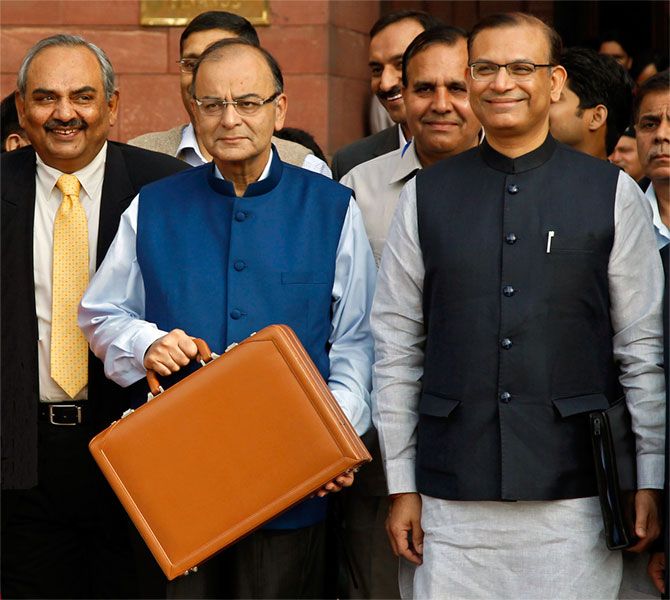In an online chat with readers a few hours after the Union Budget 2015-16 proposals were announced by Finance Minister Arun Jaitley, Sundeep Agarwal, Director, PwC India, answered related queries to help put the announcements into perspective.
Here's the unedited chat transcript:

Photograph: Vijay Mathur/Reuters
Dharmendra Kumar: Any change in existing individual income slab for the F.Y 2015~16?
Sundeep Agarwal: No change in tax slab rates for individuals
Tapan Paul: What is the breakup of individual tax payer's relief of Rs 4, 44,200?
Sundeep Agarwal: The break up is as below: Deduction under section 80C: Rs 150,000; Deduction under section 80CCD (NPS): Rs 50,000; Interest for self occupied property: Rs 200,000; Deduction under section 80D: Rs 25,000; Transport Allowance: Rs 19,200; Total: Rs 444,200
Gadgets-Gaming: Mr Agarwal, can you tell us the top proposals that will help investors and savers?
Sundeep Agarwal: Top three: Tax free bonds: Rail, Road and Infra; REIT: capital gains and pass through taxation; Additional exemption for NPS
Uday Bandekar: What are new savings for salaried people?
sai kumar: What is the tax relief for common man?
Sundeep Agarwal: Additional Investment in NPS of Rs 50,000 ; Incremental health insurance premium for self and senior citizens of Rs 10,000 each; Transport allowances from Rs 800 to Rs 1,600; Investment in NPS; Incremental health insurance premium for self and senior citizens Transport allowances from Rs. 800 to 1,600
Sai Kumar: What is the tax slab for common man???
Sundeep Agarwal: No change: same as last year
Gadgets-Gaming: How would you rate this budget Sundeep on a scale of 0 to 10? What did you like the most in this budget?
Sundeep Agarwal: I would rate 7 (assuming 0 is for minimum and 10 is highest). Its growth-oriented budget which will help our economy, mid-term to long-term.
Ramakant Saboo: The govt has announced that Rs 50000 additional tax benefits will get by putting in pension scheme. Can u clear if I bought a pension scheme from any insurance co can I get relief?
Sundeep Agarwal: It’s a New Pension Scheme (NPS).
Nagaraju Pallapolu: What is the difference between 80C & 80CCD? I am already investing 150000 in 80C, if invest 50000 more in 80CCD am I applicable to get tax benefit for my additional 50000 in 80CCD?
Sundeep Agarwal: Yes. This additional benefit of Rs 50,000 is only when you invest in New Pension Scheme (NPS).
Naresh Mal Lodha: What is corporate tax rate for AY 16-17?
Sundeep Agarwal: Reduction of corporate tax rate from 30% to 25% for the next 4 years which will however be accompanied with removal of certain exemptions / benefits available to Corporations. The withdrawal of exemptions / benefits will be done in a phased manner and will be applicable from FY 2016-17.
Ganesh Bangera: What investments OR items are covered under Section 80C, 80CCD, 80D?
Sundeep Agarwal: 80C includes LIC, school fee, employee contribution to PF, repayment of housing loan (principal), specified fixed deposits, etc.; 80CCD includes NPS; 80D includes Health Insurance Premium.
Subrata Kar: what about GST?
Sundeep Agarwal: Government is intending to implement effective 1 April 2016.
Indra Singh: Do the IT rules remain the same as existing for individual tax payers?
Sundeep Agarwal: IT Rules from an individual perspective are same, except change in Transport Allowance from Rs 800 per month to Rs 1,600 per month. However, there are lot of changes from employer perspective, like documentary proof needs to be obtained before allowing any claims / exemptions, etc.
Mutyala Ranga-Rao: How does a govt employee benefit with the new budget proposals?
Sundeep Agarwal: Key benefits are: Additional Investment in NPS of Rs 50,000 ; Incremental health insurance premium for self and senior citizens of Rs 10,000 each; Transport allowances from Rs 800 to 1,600; Investment in NPS; Incremental health insurance premium for self and senior citizens Transport allowances from Rs 800 to 1,600
Rinusirisha Mamen: Hi sir, every service has come under service tax i.e. 14% which is 2 much,*The MIDDLE class is burned out in this budget…
Sundeep Agarwal: With the control of inflation, it may be possible that the 2% increase in service tax is compensated. This increase of service tax is also in line with GST implementation next year
Niran: what is the benefit of increasing service tax to common persons?
Sundeep Agarwal: This is more in line with implementation of GST next year. The GST rates may range between 16-18%. Hopefully, this increase rate of service tax is compensated by controlling inflation.
Srikumar N: What is this 10% TDS of Provident fund? Applies to PPF too?
Sundeep Agarwal: TDS is applicable only for EPF Trust. It does not seem to be applicable for PPF.
Naresh Mal Lodha: How much is investment in Infra Bonds is exempted from tax?
Sundeep Agarwal: There is no exemption for investment in Infra bonds. It is proposed that the interest income from infra bond is tax free.
Naresh Mal Lodha: Any changes in Sec 80DD?
Sundeep Agarwal: Key changes in 80DD Disability limit increased to Rs 75,000 from Rs 50,000; Severe disability limit increased to Rs 125,000 from Rs 100,000
Balakrishna Shetty: Investment in to sukanya samruddhi account is it separate or comes under 80c (1500000). Investment in nps and ppf is it same?
Sundeep Agarwal: Sukanya Samriddhi under 80C only; for NPS an additional exemption for Rs 50,000 in additional to 80C of Rs 1.5 lakh.
Shailesh Kumar: What is EPF TRUST?
Sundeep Agarwal: It’s Employee Provident Fund Trust framed under section 5 of EPF Act
Sundeep Agarwal: It was really a pleasure to interact with you all! May these changes bring sustainable growth for our economy and make our lifestyles better... Thank You!
Image: ndia's Finance Minister Arun Jaitley (C) poses as he leaves his office to present the 2015-16 federal budget in New Delhi February 28, 2015.
Also Read:










